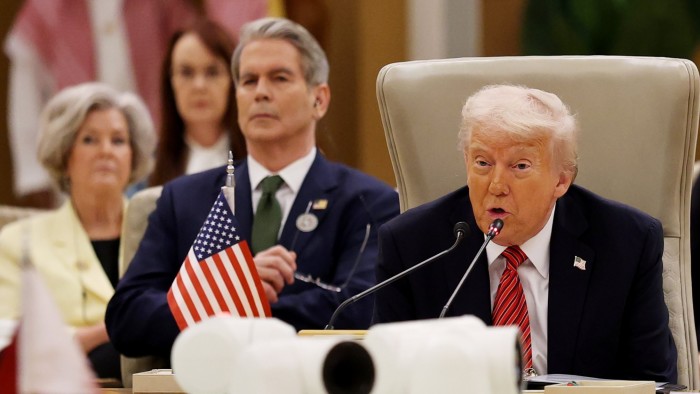Unlock the White House Watch newsletter for free
Your guide to what Trump’s second term means for Washington, business and the world
The writer is director of economic policy studies at the American Enterprise Institute
If an American president wanted to send the US economy into recession, then driving up tariff rates to levels not seen in over a century and instituting a de facto embargo on China would be a good strategy.
Engineering a recession wasn’t Donald Trump’s goal when launching his trade war this spring, but investors were less interested in his motives than in the effects of his policies and the atmosphere of chaos he created. Equity values and the dollar fell, while bond yields rose — and economists went on recession watch.
But Trump’s startling decision on Monday to cut the tariff rate on Chinese imports by 115 percentage points sent markets soaring and led economists to lengthen their odds on a downturn. And rightly so. A recession this year is unlikely. Trump seems eager to de-escalate the conflict with China, arguing that he doesn’t wish to “hurt” them and praising his “very, very good” relationship with Beijing. Treasury secretary Scott Bessent was even stronger, saying: “Neither side wants a decoupling.”
Trump also seems to want a de-escalation of his trade war more generally. Kevin Hassett, director of the National Economic Council, said last Friday that two dozen trade deals “are this close to being resolved”, which he argued would “be very settling for markets”. And on Thursday Trump was talking up a potential trade deal with India.
Another reason for a more optimistic economic outlook is that over the past few weeks, Trump has revealed a willingness to pivot when markets apply adequate pressure. After adverse market reactions, he put his “liberation day” so-called reciprocal tariffs on ice. Despite continuing to grouse about Federal Reserve chair Jay Powell, he has now clearly stated that he has no intention of firing him.
As with pressure from markets, Trump’s bad poll numbers will eventually lead him to pivot. Remarkably for a president elected largely to address high prices, his overall net approval rating — under water at minus 10 per cent — now outperforms his rating on trade (minus 15 per cent) and inflation (minus 26 per cent), according to a recent YouGov poll.
Even allowing for this week’s dial-down, Trump has increased the US’s average effective tariff rate by around a factor of six since taking office in January. He will become even less popular, including among Republicans, as consumer prices rise. As that cycle unfolds, growing anxiety about the midterm elections means members of his party will increasingly find the courage to speak out against his tariffs.
Moreover, the trade war is already taking up most of the political oxygen in Washington, putting at risk his efforts to extend expiring provisions of his 2017 tax cuts. Trump seems certain to lower tariff rates before he allows a Republican electoral wipeout and massive tax increase next year.
Another reason for a more optimistic outlook is the US economy’s resilience over the past two months. Last month, employers added more net payroll jobs than in January or February of this year, and the unemployment rate did not increase.
The monthly payroll survey is conducted during the pay period that included April 12, which gives us a window into the labour market’s performance in the first half of the month. This is before much of the trade war damage might have occurred but there was no meaningful increase in new claims for unemployment benefit for the weeks ending April 26, May 3 or May 10.
Meanwhile, the headline drop in first-quarter GDP growth was deceptive. Last quarter, data from the US commerce department show that real consumer spending grew by 1.8 per cent from the end of 2024. Business fixed investment reversed its fourth-quarter decline, adding 1.3 percentage points to first-quarter growth. Relative to the first quarter of 2024, real GDP grew by a very healthy 2 per cent.
To be clear, Monday’s de-escalation does not merit uncorking the champagne. The economy is not out of the woods — the average effective US tariff rate is still higher than it has been since the Smoot-Hawley era of the 1930s.
Fewer container ships at American ports suggests that at least some shelves will be empty and that lay-offs for transport and warehouse workers are likely. Tariffs will raise consumer prices, reducing real incomes and leading consumers to cut back on spending. US manufacturers import parts and equipment, so tariffs will reduce their competitiveness and reduce their demand for workers. The massive uncertainty from Trump’s volatile trade policy will be a drag on business investment and expansion.
And my optimism might be misplaced. At the first sign of problems in the hard economic data, businesses might start laying off workers and freezing their spending. Small businesses may not be able to weather even a few months of large increases in the cost of imports. Given the worrying rise in medium-term inflation expectations, the Fed may not be able to cut rates to soften the blow from lower incomes and weaker demand.
Still, Trump’s eagerness to de-escalate, willingness to pivot and the resilience of the economy suggest the US can avoid the worst. This does not mean it will achieve the best. Trump’s trade war remains an astonishing act of self-sabotage that will slow growth and increase unemployment. Avoiding a recession is a perverse and tragic metric of success.
Read the full article here




